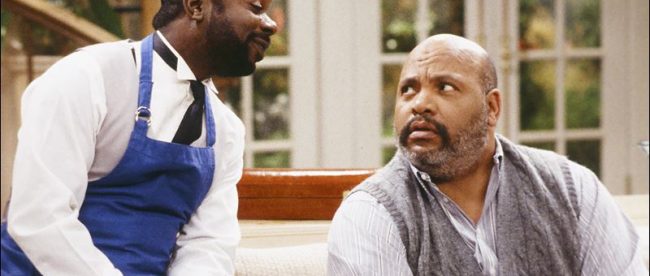The Weekender, August 11, 2017

1) “The Real Butlers of the .001 Percent” (GQ, 16 minutes, May 2014). Thanks to reader Matt H. for sharing this one. A man goes to butler school to learn what it means to be a butler. The intro is below, but this sentence caught me by surprise: “Thirty-five years ago, there were only a few hundred butlers left in Britain; today there are roughly 10,000, plus thousands more abroad, including the fastest-growing butler market of them all, China..”
It’s the first morning of butler school in London, and I’m flanked by eleven classmates who paid $2,700 for the privilege of learning to be servants. We’ve convened in a conference room at the London headquarters of Bespoke Bureau, the elite staffing agency that runs the school. Compared with the royal grandeur just outside—a medieval stone courtyard where the lord mayor’s coronation carriage is on display—the office space itself is more Dunder Mifflin bland, perhaps a first taste of the upstairs-downstairs dynamic to come. We’re soon joined by instructor Steve Ford, 47, a sturdily built Welsh butler charged with teaching us formal table service, etiquette, and household management.
Ford gives each of us a good once-over, making sure we look the butler part: neat hair, clipped nails, no visible tattoos or jewelry other than wedding rings, even on the women. (Genderwise, our class is split fifty-fifty.) He checks our shoes, which, he says, should be “polished, enough that you can shave in them, but never outshine your boss’s.” Then he passes out our uniforms for the week—black ties and white shirts over black trousers—and orders us each to take a turn at an ironing board set up in the center of the room, introducing ourselves as we press the wrinkles from our duds. (Or in my case, replace them with fresher wrinkles.)
My fellow trainees range in age from 25 to 49 and include a stewardess on the yacht of an American cosmetics billionaire, a Singaporean hotel manager, and a British-army sniper formerly stationed in Afghanistan who once worked as the concierge at a five-star hotel. All have previous experience in the high-end-service sector. Meanwhile I can’t tell you if the dinner fork goes to the left or the right of the soufflé fork. Or do you eat soufflé with a spoon?
2) Support Now I Know: As many of you already know, researching, writing, and (save for the daily typo or two) editing Now I Know is a pretty big endeavor on my part. Keeping the project financially sustainable is a battle, and to that end, I’ve tried many different avenues.
One of them — a major one at that — is my ongoing Patreon campaign. It’s an old-style patronage campaign, where readers such as yourself support Now I Know through a monthly pledge. A $5 a month pledge comes out to about 25 cents per article I send; a $1 a month pledge is roughly a nickel. Please consider supporting Now I Know through Patreon by clicking here. It’s entirely optional and you’re under no obligation to do so, so don’t feel bad if you can’t or don’t want to. But if you do, please know it all adds up, and I greatly appreciate your support. Thanks!
3) The Now I Know Week in Review:
Monday: A Berry Loopy Lawsuit — meet the team that argued that Crunchberries are fruit.
Tuesday: The Never-Built Airport That Was Never Intended to be Used Anyway. Or, why flying in the late 1960s was risky (especially if you didn’t want a free, brief vacation to Cuba).
Wednesday: A Penny (or 2,500) For Your Misdeeds. Yes, you can probably pay parking tickets in pennies. No, you probably shouldn’t.
Thursday: Münchausen by Internet. I got a TON of feedback about this one — people who lived through this scandal, people who had other examples of Münchausen by proxy, and more. I wish I could share them all — some great, often sad stories in there.
4) “The Moral History of Air Conditioning” (The Atlantic, 7 minutes, August 2017). The opening paragraph: “Until the 20th century, only the wealthy or dying might have witnessed someone trying to cool the air indoors—even though building a fire to keep warm in the winter would have been perfectly reasonable. Extreme heat was seen as a force that humans shouldn’t tamper with, and the idea that a machine could control the weather was deemed sinful. Even into the early 1900s, the U.S. Congress avoided the use of manufactured air in the Capitol, afraid voters would mock them for not being able to sweat like everyone else.”
WeekenderAdUnits
5) “My Dentist’s Murder Trial” (The New Yorker, 26 minutes, July 2017). Would you go back to a dentist who was recently indicted for murder? This reporter did.
My dentist was recently indicted for murder.” It sounds like a droll line that you’d use at a dinner party, but in my case it’s true. On October 15, 2015, Dr. Gilberto Nunez, whose patient I had been for many years, was indicted for killing his friend Thomas Kolman, of Saugerties, New York, by getting him “to ingest a substance that caused his death.” There were also two forgery counts: allegedly, Nunez had been posing as a C.I.A. agent. He’d apparently told people that he was authorized to implant tracking devices in patients’ teeth. It wasn’t the kind of news you wanted to hear about your family dentist.
[ . . . ]
I’d resigned myself to looking for a new dentist, but in April, 2016, I broke a tooth and needed urgent attention. By then, Nunez, having spent forty-one days in the county jail, was out on bail, and I called for an appointment. It wasn’t hard to get one. His office, in Kingston, which neighbors Ulster, was subdued. His son, who worked at the reception desk, looked depressed. So did his office manager, who had assured me with touching (but surely misplaced) loyalty that Dr. Nunez was innocent.
I hadn’t given much thought to the social protocols of the situation, but when Nunez beckoned me into the examining room I mumbled, “I’m sorry for your troubles.” He nodded gravely and said, “Thank you for your support.” That’s not quite what I meant, I thought, but before I could say anything more the hygienist was tilting me back in the chair.
After the procedure, I asked Nunez if we could discuss the case, and to my surprise he enthusiastically agreed.
6) “To Catch a Counterfeiter” (The California Sunday Magazine, 16 minutes, August 2017). The subhead: “Nearly all the world’s fake products come from China. America’s oldest private detective agency is on the case.” It’s an incredible look at an impossible problem — you’re always playing catch-up to the counterfeiters — but one that private eyes tackle anyway.
Have a great weekend!

